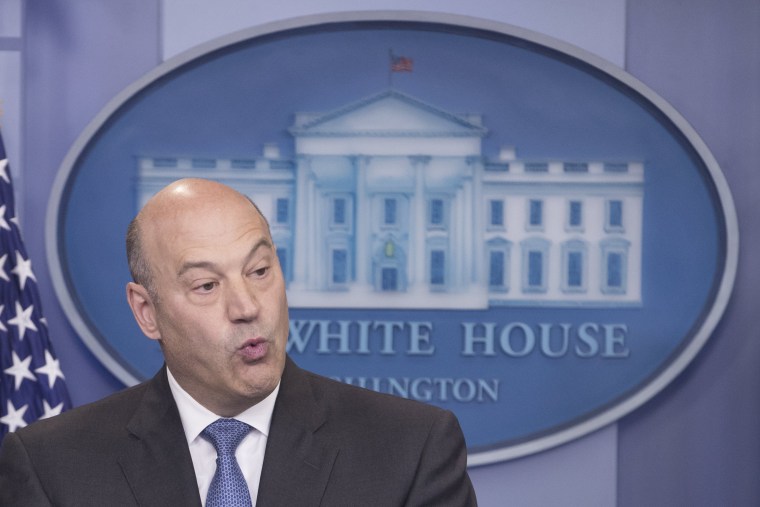Shortly after Donald Trump defended racist protesters in Charlottesville, Gary Cohn, the chairman of the White House National Economic Council and the president's top adviser on economic policy, made clear he wasn't pleased. Trump, who expects unflinching loyalty from those in his orbit, responded by refusing to make eye contact with Cohn for a while.
It led to an interview in early September in which Cohn was asked why he remained a part of Team Trump. The standard answer in any White House is for an official to say something like, "I believe in this president and his vision, and it's an honor to be part of his team." Cohn, however, said, "Look, tax cuts are really important to me."
Six months later, the Republican tax plan is law, and the president no longer seems to care about Cohn's advice on economic policy. The next step was unavoidable.
Gary Cohn, President Donald Trump's top economic adviser, resigned Tuesday after a dispute with the president over tariffs.The departure -- following reports that Cohn, the National Economic Council director, had opposed Trump's plan for large tariffs on imported steel and aluminum -- was the latest in a string of exits by top officials in the administration.
Note, this is the second major departure from the White House National Economic Council in recent months, following Deputy Director Jeremy Katz's resignation in December. Under normal circumstances, we might expect to see an NEC deputy director stick around, waiting for the NEC director to step down, in the hopes of getting a promotion. On Team Trump, however, nearly everyone seems to run away.
And therein lies the problem.
At a brief press conference yesterday, the president insisted, "You know, I read where, 'Oh, gee, maybe people don't want to work for Trump.' And believe me, everybody wants to work in the White House. They all want a piece of that Oval Office; they want a piece of the West Wing. And not only in terms of it looks great on their résumé; it's just a great place to work."
That might be easier to believe if Trump weren't in the midst of a months-long staffing exodus. Vox's Ezra Klein yesterday described it as a "staffing crisis," which seems more than fair under the circumstances.
And on that note, this seems like a good time to update the list of prominent Trump World departures:
Cabinet: HHS Secretary Tom Price
West Wing: Chief of Staff Reince Priebus, Deputy Chief of Staff Katie Walsh, Deputy Chief of Staff Rick Dearborn, National Economic Council Director Gary Cohn, Director of Public Liaison George Sifakis, Office of Public Liaison Communications Director Omarosa Manigault, Staff Secretary Rob Porter, Deputy Assistant to the President Sean Cairncross, Chief Usher Angella Reid, Assistant to the President Reed Cordish, Deputy Chief of Staff Jim Carroll (who’s leaving his post to become the “drug czar”)
White House Communications: Press Secretary Sean Spicer, Assistant Press Secretary Michael Short, Communications Director #1 Mike Dubke, Communications Director #2 Anthony Scaramucci, Communications Director #3 Hope Hicks, Rapid Response Director Andy Hemming, Speechwriter David Sorensen, Senior Communications Official Josh Raffel
National Security team: National Security Advisor Michael Flynn, Deputy National Security Advisor K.T. McFarland, Deputy National Security Advisor Dina Powell, Advisor to the National Security Council Monica Crowley, Director for intelligence programs at the National Security Council Ezra Cohen-Watnick, Deputy Chief of Staff at the National Security Council Tera Dahl, Director Of Strategic Planning at the National Security Council Rich Higgins, NSC Middle East Advisor Derek Harvey, U.S. diplomat overseeing North Korea policy Joseph Yun, Senior Advisor to the Defense Secretary Sally Donnelly, Homeland Security Deputy Secretary Elaine Duke
The self-identified “nationalist” wing: Chief White House Strategist Steve Bannon, National Security Aide Sebastian Gorka
Justice Department: Acting U.S. Attorney General Sally Yates, FBI Director James Comey, Deputy FBI Director Andrew McCabe, Principal Deputy Assistant Attorney General Mary McCord, FBI Assistant Director Mike Kortan, Justice Department’s Counterintelligence and Export Control Section chief David Laufman, Associate Attorney General Rachel Brand, dozens of U.S. Attorneys
Office of the Vice President: Chief of Staff Josh Pitcock, Press Secretary Marc Lotter, Chief Counsel Mark Paoletta, Domestic Policy Director Daris Meeks
A cavalcade of others that includes CDC Director Brenda Fitzgerald, National Economic Council Deputy Director Jeremy Katz, Domestic Policy Council Deputy Director Paul Winfree; Director of Office of Government Ethics Walter Shaub, Department of Energy Office of Indian Energy Director William Bradford, Department of Homeland Security Faith-Based Director Jamie Johnson, Corporation for National and Community Service Chief of External Affairs Carl Higbie, Office of Drug Control Policy Deputy Chief of Staff Taylor Weyeneth, Trump legal team spokesperson Mark Corallo, EPA Office of Science and Technology Director Elizabeth Southerland, State Department Counselor Maliz Beams, State Department Under Secretary of State for Political Affairs Thomas Shannon, Ambassador to Panama John Feeley, Ambassador to Mexico Roberta Jacobson, National Economic Council adviser George David Banks, Federal Railroad Administration’s acting chief Heath Hall, and Carl Icahn, who served as a special adviser to the president on regulatory reform.
As we discussed a while back, this does not include a variety of people the president nominated for prominent administrative posts – including some cabinet positions – who ultimately withdrew in the face of assorted controversies.
